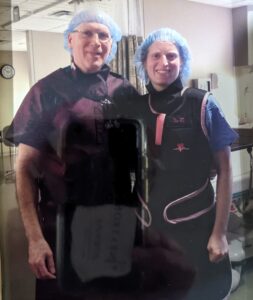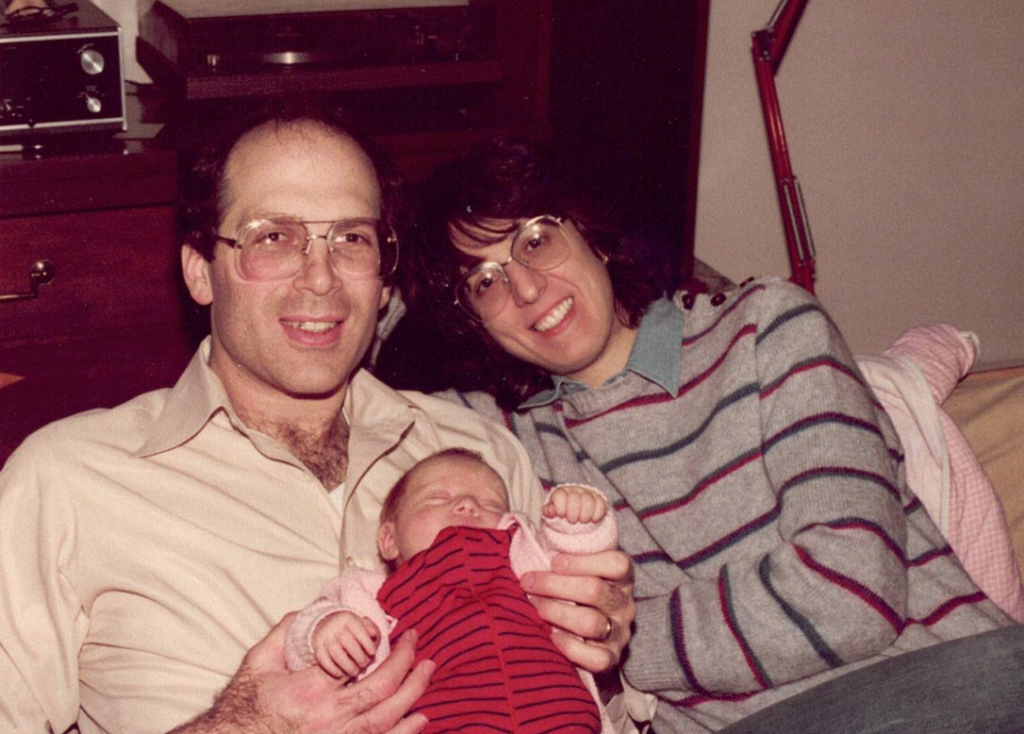This September 23rd will mark the 40th Hebrew anniversary of my first entering Shomrei Emunah – on Shabbot Shuva 1983. Judy and I had moved from New York City into an apartment in Montclair 10 months prior. Why Shabbot Shuva? – three reasons.
1) Judy was pregnant with our first child, and she wanted to become a member of this synagogue before giving birth.
2) My mother told me that Shabbot Shuva was the most important Shabbat of the year, and that I should attend, and
3) I went specifically to say a misheberach for a patient of mine who was “going down the tubes”. The patient was a holocaust survivor with a history of heart disease who was visiting from out of town. He was staying with his son in this area when he was admitted to Mountainside Hospital with chest pain. His episodes of chest pain, signaling a threatened heart attack, continued despite multiple medications. Today, such a patient would have a cardiac catheterization within hours followed by a stent or possibly bypass surgery if a stent were not possible. However, stents were not yet on the horizon. Instead, I inserted what is known as an intra-aortic balloon pump which increased the blood flow to the arteries feeding the heart while at the same time relaxing the heart and reducing the oxygen requirements of the heart.
Initially, it did not work. The patient’s chest pain continued. In addition, because of the balloon pump, the patient could not sit up and had to remain relatively stationary lest the balloon pump puncture his aorta (the main blood vessel of the body) which would result in immediate death. Because of the stress, my patient began to hallucinate about his experiences in the holocaust. It was under these circumstances that I decided a misheberach was in order. In the end, the patient recovered. The balloon pump was removed, and the patient ultimately returned to his home.
 We joined Shomrei Emunah, and on November 22 of that year, our first child, Elana, became its youngest member. And we have been here ever since.
We joined Shomrei Emunah, and on November 22 of that year, our first child, Elana, became its youngest member. And we have been here ever since.
Many years later, at the lunch table at Mountainside Hospital, I had a discussion with a few other doctors about God and prayer. I related the story about the mishberach, but upon reflection, I stated that the misheberach was really not for the patient, it was for me. Do I think that intercessory prayer (praying for the sick without their knowledge) increases the odds of their recovery? I do not, at least not without their knowledge.
So, what is the purpose of prayer as I see it?
As our (Judy’s and my) nephew, Ian, stated during his eulogy for his fourteen-year-old daughter, Orli, who passed away this March from liver cancer, “God does not pick winners and losers”. So why pray? Prayer gives us hope and the courage to keep going. It allows us to feel that someone is on our side.
As I read through the prayer book on Shabbat, I see prayer as wishful thinking. Our prayers for Orli did not result in the miracle for which we were all hoping. But praying to God was a comfort nevertheless.
Why do I participate in a service consisting of multiple prayers? Prayer, whether or not we understand the words, gives us strength. It helps us reach a spiritual state in order to communicate with a spirit larger than ourselves. Does this matter? I believe it does. For many, God is the ultimate muse. Praying to God inspires us to have the stamina to reach higher than we would normally. “Ah, but a man’s reach should exceed his grasp, O what’s heaven for?” – Robert Browning (Andrea del Sarto)
Do I believe in God? Not intellectually. However, when I examine my actions and behaviors, it is obvious to me that my actions contradict my skepticism of a higher authority – A Power which has a capacity to influence one’s future. I do believe that a belief in God provides solace and staying power. And I am ready to suspend my intellectual doubts when I am in synagogue. Prayer allows us to hope and gives us both reassurance and the fortitude to cope, even if that hope is not always fulfilled.
I am lucky that I currently teach in a medical school. Last week, in a Human Dimension course, 160 freshman students listened to a woman describe life with her two autistic children. Although she trained as an engineer, she became a special ed teacher to be able to care for her children more effectively and to give them every possible advantage. She stated that she had good days and bad days, but even the good days were bad. Following her talk, one of the medical students asked although we cannot change your situation, what can we do as physicians to help? “A listening ear” was her answer. Listen and empathize. That is pretty much all we can reasonably ask of God – but that just might be enough to give us the resilience we at times need to endure and to move forward.
- Reflections on the Civil Rights Trip: Changing My View of History - Thu, Jan 4, 2024
- Shabbat Shuva - Tue, Sep 19, 2023
- New Social Group at Shomrei - Thu, Apr 20, 2023


You have expressed beautifully the conundrum of faith in this data-based world that we live in. We look for the hard facts to prove reality, and yet there is a reality where facts exist, and the spiritual and emotional soul of a person can override them.
A beautiful message!
Well-said. God may be the ultimate Muse but we mortals have a spark of that Muse when we try to reach God.
A rabbi once told me that we say a mishebayrach not for the patient but for the doctor so he/she will have the strength to do the right thing.